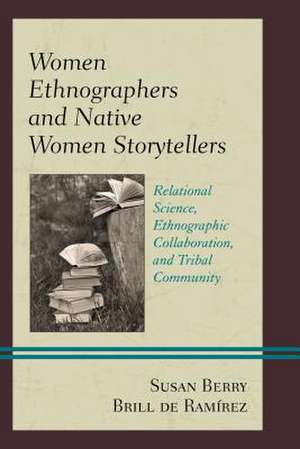WOMEN ETHNOGRAPHERS RELATIONALPB: Native American Literary Studies
Autor Susan Berry Brill de Ramirezen Limba Engleză Paperback – 20 iul 2017
Preț: 410.13 lei
Nou
Puncte Express: 615
Preț estimativ în valută:
78.53€ • 81.01$ • 65.09£
78.53€ • 81.01$ • 65.09£
Carte tipărită la comandă
Livrare economică 20 februarie-06 martie
Preluare comenzi: 021 569.72.76
Specificații
ISBN-13: 9781498510066
ISBN-10: 149851006X
Pagini: 218
Dimensiuni: 152 x 229 x 17 mm
Greutate: 0.32 kg
Editura: Rowman & Littlefield
Seria Native American Literary Studies
ISBN-10: 149851006X
Pagini: 218
Dimensiuni: 152 x 229 x 17 mm
Greutate: 0.32 kg
Editura: Rowman & Littlefield
Seria Native American Literary Studies
Notă biografică
Susan Berry Brill de Ramírez is Caterpillar Professor of English at Bradley University.
Cuprins
Acknowledgments
Chapter 1: Introduction: Women Ethnographers, Relational Science, and Native American Women Storytellers ?
Chapter 2: Franc Johnson Newcomb¿s Navajo Ethnography of Ahson Tsosie in Hosteen Klah
Chapter 3: The Interwoven Stories of Maria Chona and Ruth M. Underhill: The Autobiography of a Papago Woman Chapter 4: ¿I¿m going to tell you a story¿: Mountain Wolf Woman and Transitional Ethnographic Relations
Chapter 5: The Convergence of Life and Myth as Testimonio in Julie Cruikshank¿s Life Lived Like a Story
Chapter 6: Mrs. Angela Sidney¿s Stories about the Gold Rush Years and their Colonizing Effects on the First Nations People of the Yukon
Chapter 7: Indigenous Origination in Bighorse the Warrior by Tiana Bighorse and Noël Bennett
Epilogue: The Value of Women¿s Relational Ethnographic Practice: Epistemology, Methodology, and Pedagogy
Works Cited
About the Author
Descriere
This book focuses on the pioneering collaborative work between Native women storytellers and women ethnographers/editors. In this review of the intersubjectively relational methodologies of these women, we see that the most exemplary ethnographies are integrally grounded in and of value to the tribal communities of the Native women storytellers.

